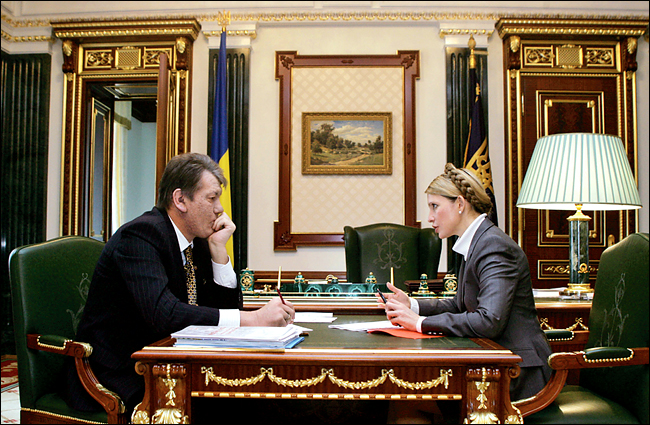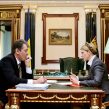
UKRAINE’S TOP THREE LEADERS REQUEST NATO MEMBERSHIP ACTION PLAN
Publication: Eurasia Daily Monitor Volume: 5 Issue: 10
By:

On January 16 Ukraine’s President Viktor Yushchenko, Prime Minister Yulia Tymoshenko, and Parliament Chairman Arseny Yatsenyuk made public a joint letter to NATO Secretary General Jaap de Hoop Scheffer, declaring Ukraine’s readiness to advance to a Membership Action Plan (MAP) with NATO and requesting a decision to that end by the Alliance at its Bucharest summit in early April.
The three Ukrainian leaders’ letter states that the country sees itself as part of the Euro-Atlantic security space; is determined to counteract threats to common security alongside NATO countries; and is committed to continuing its participation in NATO-led peacekeeping and anti-terrorist operations. The leaders state that progress already achieved within the NATO-Ukraine Intensified Dialogue constitutes a strong basis for advancing to a MAP.
Citing “deep and irreversible democratic changes [that] enable Ukraine to fulfill all the necessary criteria for NATO membership,” the letter assures the Alliance that Ukraine would broaden and deepen reforms of the security and defense sector. Furthermore, the government intends to explain the merits of NATO-Ukraine cooperation more clearly to the Ukrainian public and significantly increase budget funding for such explanatory efforts. The people of Ukraine will in any case be “consulted [by the leadership] about the question of Ukraine’s future membership in NATO.”
Based on the country’s readiness to undertake “new commitments” in its relationship with the Alliance, the three leaders trust that the upcoming summit would approve a decision whereby Ukraine would enter into a membership action plan with NATO (www.president.gov.ua, January 16).
Elaborating on the letter, Presidential Secretariat deputy chief (responsible for foreign policy) Oleksandr Chaliy told journalists that the key policy issue involves upgrading the format of NATO-Ukraine relations, after the 2004-2007 Intensified Dialogue has been fully utilized and by now almost exhausted its potential. Chaliy drew more explicitly than the letter a distinction between membership and the MAP process, which he described as one stage toward the ultimate goal of membership (Interfax-Ukraine, January 16).
Declining to forecast a time frame for attaining that goal, Chaliy underscored the need to develop internal political support in Ukraine for NATO membership. At the end of the MAP process, the membership issue will be put to a referendum: “This is the clear position of the president, government, and parliament.” However, this would be a “consultative” referendum. Chaliy pointedly noted that joining NATO is a matter for nations, not just leaders or governments. Meanwhile, Ukrainian diplomats are now holding talks with “key” NATO member countries to develop support for a MAP decision at the Alliance’s summit (www.president.gov.ua, UNIAN, January 16).
The three top leaders actually signed the letter to de Hoop Scheffer on January 11 (sending it presumably that day), but made it public on the 16th at the end of U.S. Senator Richard Lugar’s visit to Ukraine. On January 10 the Tymoshenko-led cabinet of ministers announced its own action plan on foreign policy, including an unambiguously stipulated goal of full membership in NATO. However, the government’s program also envisages that Ukraine’s ultimate decision on membership would be taken “by referendum only” (UNIAN, January 10).
The imminence of NATO’s summit clearly precipitated the Ukrainian leaders’ letter, as the lead time to the summit is tightening and the allies’ ability to work out a pre-summit consensus on this issue is becoming more problematic. In Ukraine itself, however, the governing coalition of the Yulia Tymoshenko Bloc and the Our Ukraine-People’s Self Defense bloc took office in December 2007 with a solid internal consensus regarding the goal of NATO membership. Yushchenko and his followers had been committed to this goal all along, although the president himself pursued it without consistency or resolve, allowing short-term partisan considerations at times to trump the strategic goal of joining or NATO and even decelerating cooperation programs. For her part, Tymoshenko embraced that goal late but convincingly during the home run to her second premiership, as stated in the landmark article she signed for the September-October issue of the U.S. journal Foreign Affairs and subsequent pronouncements.
Georgian President Mikheil Saakashvili’s January 5 reelection, and the concurrent plebiscite that shows more than 70% Georgian public support for NATO membership, also encouraged the three Ukrainian leaders to send their letter to NATO. In debates within the Alliance from its 2006 Riga summit onward, supporters of membership action plans for Ukraine and Georgia have argued for a “package” solution to invite both countries to join MAPs at the Bucharest summit.
The letter and accompanying statements are replete with indirect references to the deficit of Ukrainian public support for NATO membership. Such support remains confined to some 20% of the overall electorate (stronger in western and weaker in eastern regions), according to public opinion surveys in the last few years. The support has actually declined to that level in the Orange revolution’s aftermath. This situation explains not only the declared intent to launch more serious public information programs, but especially the reassurances that any decision on membership would ultimately be submitted to a referendum. Unsurprisingly, the presidency also envisages an escape clause whereby that referendum would be consultative.




